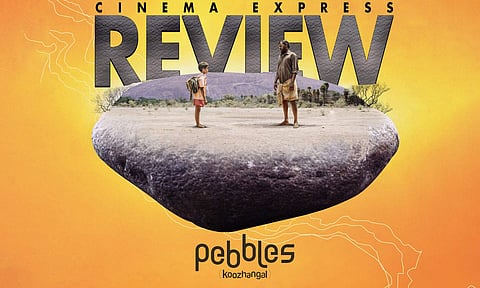Koozhangal (Pebbles) Review: Unravels profound themes with a pronounced film language
Rating:(4 / 5)
Every time a scene plays out in Koozhangal (Pebbles), the world of the film envelopes you way before the characters, their thoughts, actions and motives leave their mark. A man walks through a village; you notice the heaviness of his barefoot steps, the mid-day lull that fills the streets, the grey, thorny vegetation, and the rustle of firewood as someone stacks it up in the background. Koozhangal reels you in with such a pronounced film language that accentuates the aesthetics of the film.
Director: PS Vinothraj
Cast: Chellapandi, Karuththadaiyaa
An abusive, alcoholic father pulls his son out of school and drags him all the way to his estranged wife’s village so he can threaten her to come back. After finding out that she has already returned home, the father and son walk back home through vast stretches of arid landscape. Through their journey, we observe and unravel the themes of the film without it being force-fed through expository dialogues or overcooked editing. We witness how trauma reverberates through the microcosm of a family, the destructive fragility of the male ego, and how the young and the innocent deal with it in their own way. The central axis of the story—and the only loud and brash aspect of a film entrenched in subtlety—is the irrepressible anger of the father and how he spews it as violence upon everyone around him, especially his son. However, Koozhangal does balance these heavy emotions with moments of levity, like when the little boy has his revenge by using a shard of mirror to focus the scorching sun on the bare back of his father.
Koozhangal has certain disjointed scenes that don’t necessarily feed into the central narrative but nevertheless tie into the overall theme of the film. While this could have come across as indulgent tangents in other films, here they register as poetic interludes that further amplify the themes. One such poignant stretch is when a visibly distraught mother gets down from a bus to breastfeed her baby in the middle of a barren land after a scuffle breaks out between two male passengers. The visuals punctuate the moment so effectively that it is hard not to register the irony of violence being meted out unapologetically in public while a mother is forced to find privacy and quiet to feed her child. What further elevates that moment, is when the wide shot of her breastfeeding is then cut to a closeup of the statue of a goddess with exposed breasts, surrounded by figurines of men praying to her in reverence.
From the minimal yet affecting dialogues to the rustic setting, deceptively tame visuals, and grounded performances, director Vinothraj seems to place an acute focus on making the film feel realistic. However, Koozhangal never loses sight of the delights of storytelling and the excitement of drama. This is how it preserves its entertainment factor and never devolves into a self-serious pretentious drama that art films are often accused of being. With scenes involving a passing snake and what could be perceived as a paranormal entity, Koozhangal even feels like folklore.
The characters in the film do not go through an arc, nor do they gain any wisdom or have their lives transformed in any meaningful way. Ironically, that ends up being the very tragedy that the film attempts to highlight. And it is not the kind of tragedy that goes to exorbitant lengths to evoke strong emotions out of you. In fact, Koozhangal hardly even registers as a tragedy. It employs subtlety to show us that the tragedy is inherent in the story and not something that suddenly strikes these individuals in a dramatic fashion. If the film does falter anywhere, it is the dissatisfaction you feel when you realise that such a distinct cinematic grammar was employed to present themes and ideas that are not necessarily new. It's not that every filmmaker needs to come up with a dissertation of ideas or write a book of philosophy before making their arthouse film. It is just that Koozhangal enthrals you with such a pronounced filmmaking style that you expect it to culminate into a slightly elevated thematic high. The film nevertheless imprints itself in your memory as a strong cinematic experience.
With unassuming visuals to guide us, we are dragged along as passive observers while the film dissects an average episode of trauma in a family. Vinothraj performs this dissection with a distinct filmmaking style and unravels profound themes within the mundanity of the episode. You don’t need to know that Koozhangal is the debut film of the director to respect his craft and vision. But when you do learn that fact, hope for better cinema tags along with respect, as you understand the indelible mark it is sure to leave on the Indian film industry.

